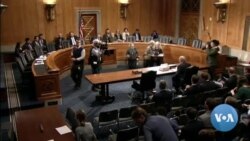ສະພາສູງ ສະຫະລັດ ໄດ້ລົງຄະແນນສຽງໃນວັນພຸດທີ່ຜ່ານມາ ກ່ຽວກັບ ຍັດຕິ ທີ່ເພັ່ງເລັງໃສ່ການຫ້າມປະທານາທິບໍດີ ທຣຳ ດຳເນີນການທາງທະຫານຕໍ່ ອີຣ່ານ ໂດຍບໍ່ໄດ້ຮັບອະນຸຍາດຈາກລັດຖະສະພາ. ສະມາຊິກສະພາສູງສັງກັດພັກເດໂມແຄຣັດ ທ່ານ ທິມ ເຄນ, ຜູ້ທີ່ສະໜັບສະໜູນຍັດຕິດັ່ງກ່າວເວົ້າວ່າ ທ່ານມີເຈຕະນາທີ່ຈະປ້ອງກັນການພົວພັນຂອງກອງທັບ ສະຫະລັດ ໃນເຂດຕາເວັນອອກກາງອີກຄັ້ງນຶ່ງ. ການລົງຄະແນນສຽງດັ່ງກ່າວໄດ້ມີຂຶ້ນນຶ່ງວັນຫຼັງຈາກບັນດາສະມາຊິກສະພາຢູ່ຄະນະກຳມະການຮັກສາຄວາມປອດໄພພາຍໃນ ແລະ ກິດຈະການລັດຖະບານ ໄດ້ຍິນການໃຫ້ການ ກ່ຽວກັບ ສະຖານະພາບການຕໍ່ສູ້ຂອງທະຫານ ອາເມຣິກາ ໃນ ອັຟການິສຖານ, ເຊິ່ງເປັນບັນຫາຂັດແຍ້ງທາງທະຫານທີ່ດົນທີ່ສຸດໃນປະຫວັດສາດຂອງ ສະຫະລັດ. ນັກຂ່າວວີໂອເອ ອາດິຕະ ດູແນລລາຣີ ມີລາຍງານ ເຊິ່ງ ພຸດທະສອນ ຈະນຳລາຍລະອຽດມາສະເໜີທ່ານໃນອັນດັບຕໍ່ໄປ.
ບັນດາສະມາຊິກສະພາສູງ ສະຫະລັດ ໄດ້ຮັບຟັງໃນຂະນະທີ່ທ່ານ ຈອນ ຊັອບໂກ, ຜູ້ກວດສອບທົ່ວໄປສຳລັບການປະຕິບັດການຟື້ນຟູໃນ ອັຟການິສຖານ ໄດ້ກ່າວລາຍງານທີ່ບໍ່ໜ້າຍິນດີ.
ທ່ານ ຈອນ ຊັອບໂກ ຜູ້ກວດກາທົ່ວໄປພິເສດສຳລັບການຟື້ນຟູ ອັຟການິສຖານ ໄດ້ກ່າວວ່າ “ທຸກຄັ້ງພວກເຮົາໄດ້ພົບເຫັນສິ່ງທີ່ເບິ່ງຄືວ່າຈະໄປໃນທາງລົບ, ມັນຈະຖືກປິດລັບ ຫຼືບໍ່ກໍບໍ່ມີຄວາມສຳຄັນອີກຕໍ່ໄປ.”
ດັ່ງຜົນທີ່ຜ່ານມາ, ທ່ານ ຊັອບໂກ ໄດ້ກ່າວວ່າ ລັດຖະສະພາ ແລະ ສັງຄົມ ອາເມຣິກາ ແມ່ນບໍ່ໄດ້ຮູ້ສະພາບການທີ່ແນ່ນອນ ກ່ຽວກັບ ຄວາມພະຍາຍາມຟື້ນຟູຂອງ ສະຫະລັດ ໃນ ອັຟການິສຖານ.
ທ່ານ ຈອນ ຊັບໂກ ໄດ້ກ່າວວ່າ “ຂ້າພະເຈົ້າບອກທ່ານຢ່າງເປີດເຜີຍບໍ່ໄດ້ ວ່າ ວຽກງານທີ່ເຮົາກຳລັງເຮັດໃນການຝຶກສອນແມ່ນເປັນແນວໃດ. ເງິນ 64 ຕື້ໂດລາໄດ້ຖືກມອບໃຫ້ການຝຶກຊ້ອມ ແລະ ການຊ່ວຍເຫຼືອກອງທັບ ອັຟການິສຖານ ແລະ ຂ້າພະເຈົ້າບອກທ່ານ ແລະ ປະຊາຊົນ ອາເມຣິກັນ ບໍ່ໄດ້ ແລະ ນັ້ນກໍແມ່ນສ່ວນນຶ່ງ ເພາະວ່າພວກເຮົາອະນຸຍາດໃຫ້ລັດຖະບານ ອັຟການິສຖານ ເກັບຄວາມລັບສຳລັບໃນສິ່ງທີ່ຂ້າພະເຈົ້າສາມາດບອກພວກທ່ານ.”
ທ່ານ ຣິເຈີດ ບາວເຈີ, ອະດີດລັດຖະມົນຕີຊ່ວຍວ່າການກະຊວງຕ່າງປະເທດ ທີ່ມີໜ້າທີ່ຮັບຜິດຊອບເຂດເອເຊຍໃຕ້ ໃນລະຫວ່າງ ລັດຖະບານທ່ານ ບຸຊ ໄດ້ອະທິບາຍມັນວ່າເປັນແຜນຍຸດທະສາດທີ່ປະສົບຄວາມລົ້ມແຫຼວ ເພື່ອສ້າງລັດຖະບານທີ່ໝັ້ນຄົງໂດຍອີງໃສ່ຄວາມເຂົ້າໃຈໃນທາງທີ່ຜິດ ກ່ຽວກັບ ຄວາມເປັນຈິງຢູ່ພາກ ພື້ນດິນ.
ທ່ານ ຣິເຈີດ ບາວເຈີ ກ່າວວ່າ “ໂດຍລວມແລ້ວພວກເຮົາໄດ້ປະສົບຄວາມລົ້ມແຫຼວ ແລະ ຍັງບໍ່ສາມາດທີ່ຈະສ້າງຄວາມໝັ້ນຄົງໄດ້ ເພາະວ່າພວກເຮົາບໍ່ສາມາດທີ່ຈະໃຫ້ອຳນາດລັດຖະບານ ອັຟການິສຖານ ເພື່ອໃຊ້ຜົນປະໂຫຍດຂອງລັດຖະບານຕໍ່ຊາວ ອັຟການິສຖານ ໃນລະດັບທ້ອງຖິ່ນ.”
ການພົວພັນຂອງ ອັຟການິສຖານ ໄດ້ເຮັດໜ້າທີ່ເປັນບົດຮຽນທີ່ສຳຄັນໃນສົງຄາມກໍ່ການຮ້າຍ, ອີງຕາມການກ່າວຂອງທູດ ບາວເຈີ.
ທ່ານ ຣິເຈີດ ບາວເຈີ ໄດ້ກ່າວວ່າ “ພວກເຮົາຕ້ອງນຳໜ້າດ້ວຍການທູດທີ່ໄດ້ຮັບການໜູນຫຼັງໂດຍຄວາມສາມາດທາງທະຫານ, ບໍ່ແມ່ນໃນດ້ານກົງກັນຂ້າມ. ແລະ ສຳຄັນທີ່ສຸດ, ພວກເຮົາຕ້ອງໃຫ້ທຶນຕໍ່ການທູດຂອງພວກເຮົາ ສະນັ້ນຄົນ ອາເມຣິກາ ພວກເຮົາຈຶ່ງສາມາດນຳໜ້າໄດ້.”
ອະດີດນັກການທູດ ໄດ້ກ່າວເພີ່ມເຕີມວ່າ ການແຊກແຊງຂອງ ສະຫະລັດ ໃນ ອັຟການິສຖານ ໄດ້ມາເຖິງຈຸດຈົບແລ້ວ.
ທ່ານ ຣິເຈີດ ບາວເຈີ ໄດ້ກ່າວວ່າ “ໃນທັດສະນະຄະຕິຂອງຂ້າພະເຈົ້າ, ມັນເຖິງເວລາແລ້ວທີ່ຈະກັບບ້ານ.”
ໃນຂະນະທີ່ການແຂ່ງຂັນເພື່ອຊິງຕຳແໜ່ງໃນທຳນຽບຂາວ ກຳລັງດຸເດືອດຂຶ້ນນັ້ນ, ກໍໄດ້ມີການຟື້ນຟູການເຈລະຈາກັນຄືນໃໝ່ ກ່ຽວກັບ ເພື່ອສິ້ນສຸດການມີໜ້າຂອງກອງທັບສະຫະລັດ ໃນ ອັຟການິສຖານ.
ໃນຄຳປາໄສຕໍ່ສະພາ ແລະ ປະເທດຊາດຂອງທ່ານນັ້ນ, ປະທານາທິບໍດີ ດໍໂນລ ທຣຳ ໄດ້ກ່າວຢ້ຳເຖິງຄຳສັນຍາຂອງທ່ານທີ່ຈະຍຸດຕິສົງຄາມຂອງ ອາເມຣິກາ ໃນເຂດຕາເວັນອອກກາງ.
ໃນຂະນະດຽວກັນ, ສະພາສູງ ສະຫະລັດ ໄດ້ລົງຄະແນນສຽງໃນວັນພຸດທີ່ຜ່ານມາ ກ່ຽວກັບ ຍັດຕິທີ່ໄດ້ຮັບການສະໜັບສະໜູນໂດຍສະມາຊິກສະພາສູງສັງກັດພັກເດໂມແຄຣັດ ທ່ານ ທິມ ເຄນ ເພື່ອຈຳກັດຄວາມສາມາດຂອງປະທານາທິບໍດີ ໃນການອອກຄຳສັ່ງດຳເນີນການທາງທະຫານ ໂດຍບໍ່ໄດ້ອະນຸຍາດຈາກສະພາ. ມາດຕະການດັ່ງກ່າວໄດ້ມີຕົ້ນກຳເນີດມາຈາກຄວາມເປັນຫ່ວງທີ່ວ່າ ປະທານາທິບໍດີ ທຣຳ ອາດທຳການໂຈມຕີທາງທະຫານຕໍ່ ອີຣ່ານ, ຫຼັງຈາກກຳລັງທະຫານ ສະຫະລັດ ໄດ້ຂ້ານາຍພົນ ອີຣ່ານ ທ່ານ ກາສເຊັມ ໂຊເລມານີ.
ຜູ້ນຳສຽງສ່ວນຫຼາຍ ໃນສະພາສູງ ສະຫະລັດ ທ່ານ ມິດຈ໌ ແມັກຄອນແນລ ໄດ້ຮຽກຮ້ອງບັນດາສະມາຊິກໃນສະພາ ໃຫ້ເອົາຊະນະຍັດຕິດັ່ງກ່າວ, ໂດຍເວົ້າວ່າ ມັນ “ຈະຈຳກັດການປະຕິບັດການທີ່ປ່ຽນແປງໄດ້ຂອງກອງທັບ ສະຫະລັດ ເພື່ອປ້ອງກັນຕົນເອງຕໍ່ໄພຂົ່ມຂູ່ຈາກ ອີຣ່ານ.”
The U.S. Senate votes on Wednesday on a resolution aimed at restricting President Donald Trump from taking military action against Iran without Congressional authorization. Democratic Senator Tim Kaine, who sponsored the resolution, says he intends to prevent another U.S. military engagement in the Middle East. The vote comes one day after senators on the Homeland Security and Government Affairs Committee heard testimony on the state of the American engagement in Afghanistan, the longest military conflict in US history. VOA's Ardita Dunellari reports.
U.S. Senators listened as John Sopko -- the nation's top inspector general for U.S. reconstruction efforts in Afghanistan -- delivered a grim report.
The U.S. effort is failing to meet major objectives and overall lacks transparency, he said, in part because of stonewalling by Afghan authorities and U.S. agencies attempting to cover up failures and mismanagement.
"Every time we find something that looks like it's going negative, it gets classified or is no longer relevant."
As a result, Sopko said Congress and the American public aren't getting an accurate picture of U.S. reconstruction efforts in Afghanistan.
"I can't tell you publicly how well a job we're doing on training. $64 billion has gone for training and assisting the Afghan military and I can't tell you and the American people and that's in part because we allow the Afghan government to classify what I can tell you."
Richard Boucher, former Assistant Secretary of State for South Asia during the Bush administration, described it as a failed strategy to build a stable governance based on a misguided understanding of realities on the ground.
"Overall we failed and still fail to build stability because we failed to empower the Afghan government to deliver the benefits of government to Afghans at the local level."
The Afghanistan engagement serves as an important lesson in the war on terror, said Ambassador Boucher:
"We need to lead with diplomacy backed by our military capability, not the other way around. And most importantly, we need to fund our diplomacy so that American canlead."
The former diplomat added the U.S military intervention in Afghanistan has run its course:
"In my view, It's time to come home."
As the race for the White House heats up, there is renewed talk about ending the U.S. military presence in Afghanistan.
In his State of the Union address, President Donald Trump repeated his promise to end America's wars in the Middle East.
Meanwhile, the U.S. Senate will vote Wednesday on a resolution sponsored by Democratic Senator Tim Kaine to limit the president's ability to order military action without congressional authorization. The measure originated out of concern that President Trump may conduct military strikes against Iran, after US troops killed Iranian General Qassem Soleimani.
Senate Majority Leader Mitch McConnell is calling on members of the chamber to defeat the resolution, saying that it "would severely limit the U.S. military's operational flexibility to defend itself against threats posed by Iran."





